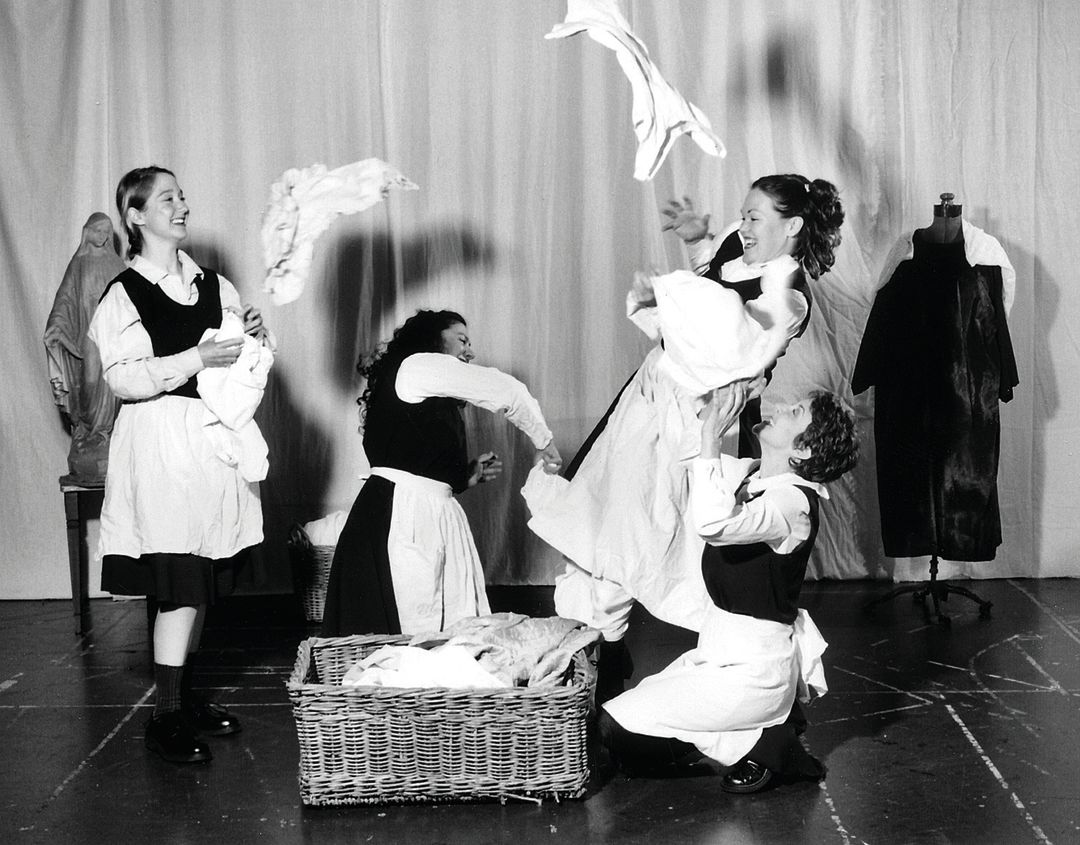A Portland Company Airs Ireland’s New Plays—and Dark Past

Gemma Whelan’s 2004 production of Eclipsed
Image: Courtesy Adam Liberman
As a boarding school student in Ireland, Gemma Whelan remembers seeing the young women who did the laundry. They worked behind a tall convent wall, Whelan recalls, and she knew they’d done something wrong. This being Ireland in the ’70s, that something probably involved sex.
These were inmates of the Magdalene laundries, church-run workhouses that took in “fallen women,” typically unwed mothers, for a lifetime of harsh labor. (The system was captured to maximum grim effect in the 2002 film The Magdalene Sisters, and more recently in the Judi Dench vehicle Philomena.)
Now, more than four decades after first glimpsing those Magdalene girls—and exactly 20 years after the last laundry closed—Whelan takes on the subject with Corrib Theatre, her ambitious Portland company devoted to Irish drama. She’s planned a mini-festival about the laundries, anchored by staged readings of Patricia Burke Brogan’s Eclipsed. Burke Brogan, herself a former nun, wrote the play in 1992—a year before the discovery of a mass grave of laundry workers in Dublin drew international attention to the scandal.
“It’s a really important play,” says Whelan, who met Burke Brogan on a recent visit to Ireland. (The playwright, now in her 80s, wore fingerless lace gloves.) “Patricia was the first person to speak up. She told me it took her years to get the courage to write it.”
Set in a laundry, Eclipsed follows a young nun—a stand-in for Burke Brogan—wracked with doubt about her role in the draconian system. It’s the sort of play that exemplifies Corrib’s niche mission: to stage contemporary and lesser-known Irish theater that rarely makes it across the Atlantic. (Don’t expect Waiting for Godot next season.) Since 2012, that mission has taken the form of a stripped-down solo show about soccer and politics, an all-female play set at a bachelorette party, and a poignant two-hander about late-in-life love. The work is powered not by spectacle but by psychological nuance, strong performances, and Whelan’s emotionally
astute directing.
One of eight siblings in rural County Laois, Whelan was independent and ambitious from the get-go, and started boarding school at age 11. “It was nine miles away but might as well have been 90,” she says. “The roads were really bad. My dad was one of the few people in our area who had a car—always a very secondhand, boppity car. My parents didn’t come visit me very much.”

Whelan and husband Adam Liberman in Dublin
Image: Courtesy Pat Scheans
She landed in the U.S. as a freshly minted college graduate, first in New York City. But she knew she needed to see California—so she put out a want ad in the New York Times. “It said something along the lines of, ‘Young Irish girl looking for job on the West Coast and wants fair pay,’” Whelan says, adding that she wishes she’d saved some of the less savory responses. But among the scuzzballs, she heard from an elderly, well-to-do couple seeking a nanny for their grandchildren in San Francisco. Whelan got the gig (she’s still close with the family), and started taking acting classes. That led to acting work, a graduate degree in directing, and her first company, which did a full production of Eclipsed in 2004.
Since moving to Portland in 2008, Whelan has directed across town, and built a reputation and audience.
“Gemma is just the kind of person who makes things happen out of nothing,” says former Artists Rep Artistic Director Allen Nause. “She has made such an impact on Portland theater.”
Now she’s doubling down on Corrib, with an eye toward relevant, charged work. This 50-something Irish transplant—and first-time mother, having recently become foster parents with her husband to 10- and 13-year-old siblings—is giving voice to her changing homeland, which has traveled some distance from boppity cars and laundries, even as it struggles to come to terms with that past.
“It’s a different Ireland, and it’s showing up in theater,” she says. “I want to represent that.”




